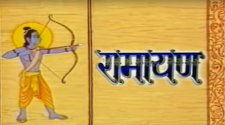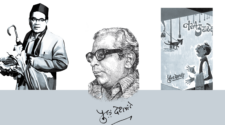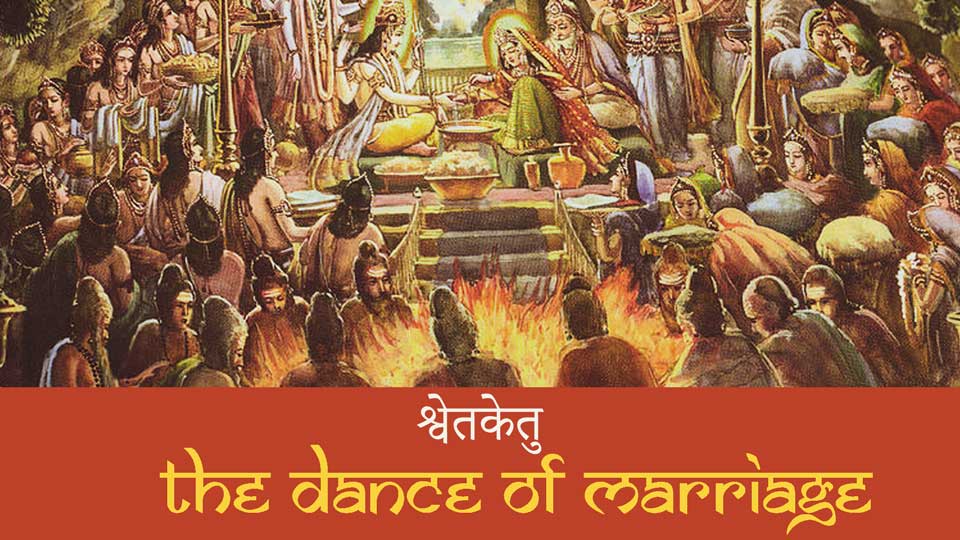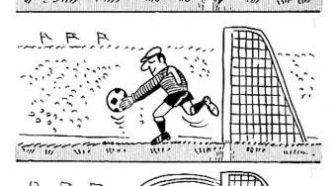Let’s go bit’ Freud’ on Shvetaketu. While growing in the ashram of seer Uddhalaka, he had another companion named Ashtavakra. This Ashtavakra grew up to becomeone of the greatest sages. His works like Ashtavakra Gita and Ashtavakra Samhita explore topics like the nature of metaphysical existence and the meaning of individual freedom.
His own story is fascinating: (it has a Bollywood Ring to it). Of the slightly varying accounts of his birth, the accepted outline is that, Ashtavakra’s father Kahoda was Uddhalaka’s disciple who later married his daughter Sujata. Kahoda was once reciting Vedas with his pregnant wife sitting next to him. Kahoda made a mistake, and the fetus from the womb corrected him. This happened eight times, enough to anger Kahoda. Feeling insulted by an unborn child, he cursed the child to be born with 8 deformities for his impudence shown towards his father. The baby born bore 8 bends/deformities and hence the name Ashtavakra.
Later Kahoda traveled to a court of a nearby kingdom for the debating science and lost to his opponent Vandin. Vandin, before starting of debate, put the condition that the one who loses to him shall immerse himself in water.
This all was kept hidden from Ashtavakra, who grew up thinking Udhalaka is his father. For years, Ashtavakra and Shevtaketu were buddies, similarly aged, growing up in the same household. Once as Udhalaka was playing with these two and Ashtavakra sat in his lap. Shvetaketu felt a sense of betrayal. He pulled him down and told Asthavakra that Udhalaka is not his father. This act of Shevtaketu shocked Udhalaka. To add salt to the wound, Shevtaketu told Ashtavakra that his father died after being defeated in shashtrartha.
Shocked and angry, Ashtavakra left with Kasam to avenge his father’s death. Left behind was a disturbed Udhalaka angry with Shevtaketu. He had both these children growing up as equals, but one had harmed the other. For Shevtaketu to realize what his actions have done, Udhalaka tells him that neither Shevtaketu is his own son: Shevtaketu was the son of his disciple. Ashtavakra and Shvetaketu were brothers not by birth but were brothers based on the love they shared for their father.
Flashback: Shvetaketu remembers the scene from his childhood where his mother walked away with some stranger. There was no ‘Right to own’ women; this revelation blew his mind off. To him, it was a blow to his identity. First of many blows. (will Freud call it lousy parenting? or bad mother?)
Cut to: Shevtaketu became a scholar trained under Udhalaka, which added to his pride and made him the “know it all” person. Sensing that pride, Udhalaka asked him what cannot be taught, cannot be seen, heard, or understood? Shevtketu said “No, he does not know any such thing.” This pushed Shevtaketu to begin his next round of studies.

Cut to: Shevtaketu, now came armed with the knowledge about what cannot be taught. This pleased his father. He then went to King Pravahana’s court in Panchala. The humble king asked him a few questions, to keep the story short, related to what happens after death. Despite knowing what cannot be taught, Shevtaketu was unable to answer and took another blow to his Self-Pride and returned to his father. Udhalaka said he doesn’t know it. With the ever-learning spirit, Udhakala advised hiem to reach out to King Pravahana and seek that knowledge. Shvetaketu avoided it because of his ego.
Cut to: few years down the line (after the Mahabharata war ended), the unified kingdoms were engaged in appointments of priests. One such Rishi Agnevsa was appointed as head/chief priest to Kosala, Kashi, and Videha. Shevtaketu felt that this should have been his position, given his family stature, high birth, and entitlement. He asked Udhalaka to use his connections to get that position, which Udhalaka absolutely refused. This led Shevtaketu to hold anger against meritocracy, causing more trouble. Later he began objecting to the drinking and what he called adultery in the Brahmins. Which in turn motivated him to make a framework for what marriage should be. What should define adultery, and what shall be sanctimonious within marriage. Shevkaketu pushed to ban polygamy and prescribed adherence to monogamy.
These and other such acts, where he took extreme positions, led him to be expelled from Udhalaka’s ashram. He was maverick, bent on changing all that he did not like. But like they say, ‘Shaadi karaado sab theek ho jayega’. Shevkaketu reunited with his childhood friend Suvarchala and got married.
This caused a tremendous shift in his nature from maverick to a mellow householder. He became a great Acharya well respected for his knowledge and wisdom. Shevkaketu laid down protocols for various yagnya, even allowed sweets for the priests, which were earlier forbidden. Later on in his life, he worked on a very famous book, almost eponymous to Indian identity in the rest of the world. This book remains unchallenged regarding its ownership by the rest of the world. Rather such a profound work of research has no parallels. This book’s journey begins with a Seer Nandi who wrote it first. Shvetaketu tediously condensed to a book with only 500 chapters named Kamashastra. With successive revisions from Babhravya, Suvarnabha, Gonardiya, and other scholars, Vatsyanana composed Kamasutra with additions from ‘Vaisika’ and ‘Samprayogika.’ A rebel who questioned, detested polygamy, drinking in his later life composed Kamshstra and allowed even his disciples to drink. He shows that learning is changing, clinging on to beliefs is stagnancy, and letting go is to grow.
What I wish to leave you all with is this; the changes Shvetaketu ushered in. Before him, society was functioning well (as per those days’ morality); he came in and changed; what he saw was wrong. We today see many things that have come from him; Ek patnivrata and pativrata are just one aspect of him. This is where Upanishads become the complex. It’s a simple story, but one that changes the lives of millions and millions since the millenniums. At the root, it is a simple change from one system to another without being judgmental. If one reads the story of Shevtaketu and his tryst with destiny, one may see how change is only the constant thing for the growth of the Self.














Finally the next part after a long time !!! Change the font please, it is not that readable